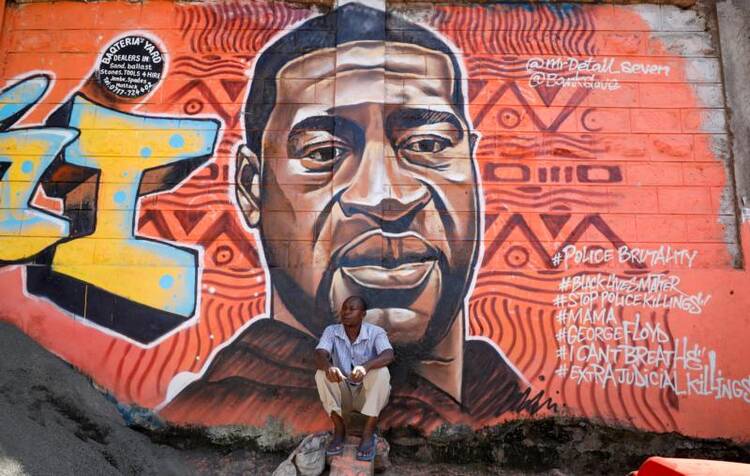ACCRA, Ghana (CNS) -- The May 25 killing of African American George Floyd continues to receive condemnation from African governments and citizens, with some describing the killing of an unarmed black man as an unjust murder.
Floyd's May 25 death occurred on African Union Day. It led to protests and vigils in some African countries and reemphasized police brutalities on African immigrants and the need to eschew racism.
Church leaders throughout the world also have condemned the death and spoken out against racism.
"We stand with our kith and kin in America in these difficult and trying times, and we hope that the unfortunate, tragic death of George Floyd will inspire a lasting change in how America confronts head on the problems of hate and racism," Ghanaian President Nana Akufo-Addo said in a tweet. He pledged to immortalize Floyd's memory by permanently mounting his name at the Diaspora African Forum and the W. E. B. Du Bois Centre for Pan-African Culture in Accra.
"Black people, the world over, are shocked and distraught by the killing of an unarmed black man, George Floyd, by a police officer in the United States of America," he added. This action, the president noted, "carried with it an all too painful familiarity and an ugly reminder."
Moussa Faki Mahamat, chairman of the African Union Commission, issued a statement condemning the "murder of George Floyd ... at the hands of law enforcement officers" and extended condolences to Floyd's family and friends. He recalled the 1964 Organization of African Unity Resolution on racial discrimination in the United States and reaffirmed "the African Union's rejection of the continuing discriminatory practices against black citizens of the United States of America."
He urged U.S. officials to intensify their efforts to ensure the total elimination of all forms of discrimination based on race or ethnic origin.
In a virtual address June 3 to the Organisation of African, Caribbean and Pacific States, South African President Cyril Ramaphosa condemned Floyd's murder and said he shared the anger of millions in the U.S. and across the world.
"As countries that have borne the brunt of racial discrimination over centuries, we need to work together to end the scourge of racial violence, wherever it occurs. By working together, we can build a peaceful, just, healthy and prosperous global community," said Ramaphosa, who is African Union chairman.
The Forum of Former African Heads of State and Government urged African countries to "raise a strong protest" to the killing and demand that the "perpetrators of this crime and all other crimes of this sort be punished in the strongest terms."
"What level of cruelty must you reach that the entire world finally wakes up and manifests its indignation," said a June 3 statement released by former Beninese President Nicephore Soglo. "Who would dare here, their face visible, to treat in such a way a European, an Arab, an Israeli, an Indian, a Chinese, a Japanese, an Argentinian, etc.? Enough is enough."
Jerry John Rawlings, Ghana's former president, asked: "If some of these atrocities, especially from some white police officers against black citizens, cannot shock the American populace to see evidence of their own decline, what can?
"How can a police officer be the source of such cruel, violent death with knee choking down a black man's neck till he is motionless? And why do these cruelties end up in farcical trials that see the evil culprits escape justice and capital punishment?" he asked.
The Pan-African Parliament said it "stands in solidarity against injustice, racism, discrimination, and violence of any kind based on race and ethnicity."
Following Floyd's death, U.S. embassies in Kenya, Uganda, Zimbabwe, Tanzania and Congo have also issued rare statements of concern and called for justice.
"We are deeply troubled by the death of Mr. George Floyd in Minneapolis. The U.S. Department of Justice is conducting a full criminal investigation as a top priority. Law enforcement officials must be held accountable in every country," the U.S. Embassy to Kenya said in a tweet.
Brian A. Nichols, the U.S. ambassador to Zimbabwe, said, "As an African American, for as long as I can remember I have known that my rights and my body were not fully my own. I have always known that America, conceived in liberty, has always aspired to be better-a shining city on a hill -- and that's why I have dedicated my life to her service."
"In a long unbroken line of black men and women, George Floyd gave the last full measure of devotion to point to us toward a new birth of freedom," he added.
In a tweet, the U.S. Embassy in Uganda said: "We are deeply troubled by the death of George Floyd in Minneapolis. Authorities have fired the officers involved and are conducting a full investigation. Government officials should not operate with impunity in any country."










